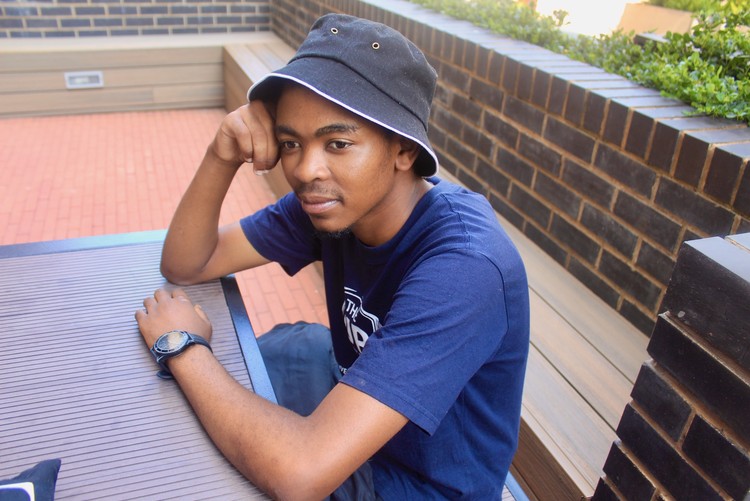University asks NSFAS to scrap cap on accommodation allowance
Pretoria students say they will struggle to find lodgings
Alex Mailola, a third-year law student from Limpopo, says his family will not be able to afford the R2,000 a month to top up his rent now that his NSFAS allowance has been capped. Photo: Mosima Rafapa
- The private accredited accommodation allowance for university students has been capped at R45,000 for 2023 by the National Student Financial Aid Scheme (NSFAS).
- Many tertiary students in private accommodation in the Pretoria area say they will struggle to find decent lodgings for that amount.
- The University of Pretoria has asked NSFAS to reconsider the spending cap.
Many tertiary students in private accommodation are battling to find lodgings this year because the National Student Financial Aid Scheme (NSFAS) has capped the private accredited accommodation annual allowance at R45,000 for 2023.
Last week, Higher Education and Training Minister Blade Nzimande said all university student allowances, except the living allowance, would increase by 5%. He said students housed at university residences would receive an annual allowance of R61,500, and those in private, accredited accommodation off campus would receive an allowance capped at R45,000.
Keneiloe Ramohapi, a second-year BSc student at the University of Pretoria (UP), says last year NSFAS gave her R60,000 for accommodation, which was already too little. She was paying R6,630 a month. She relied on her mother who runs an informal business selling honey to top up her rent.
Many UP students live in Hatfield because it is considered a safe area near the main campus. Most students GroundUp spoke to pay more than R6,000 a month in rent.
Alex Mailola, a third-year law student from Limpopo, said, “There’s no one back home who will be able to pay for me.” He said his rent had gone up from R5,900 a month last year to R6,300.
Mathapelo Nkambule, a third-year LLB student, lives at Varsity Studios, which has over 900 students, mostly NSFAS dependent, and where 10-month rentals range from R6,150 to R6,700 per month. He says his alternative is to move to Sunnyside, which is further away and “not safe”.
University spokesperson Rikus Delport said the university had sent a letter to NSFAS “to reconsider the cost, as the actual cost of both UP-owned and private accommodation exceeds the capped amount of R45,000”.
“The difference between the actual amount and the capped amount will lead to outstanding amounts on student accounts, which may not be recovered,” said Delport.
The Student Representative Council has contacted student accommodation establishments to try to get rents reduced but with little success.
NSFAS confirmed the allowance amount but did not explain the decision to cap it. Students also get an allowance for learning materials of R5,460, and those not in university residences (including those living with families) get a living allowance of R15,750. Students living with relatives also get a transport allowance of R7,875.
The Department of Higher Education and Training did not respond to our queries.
Support independent journalism
Donate using Payfast

Don't miss out on the latest news
We respect your privacy, and promise we won't spam you.
Next: Dam is full but taps are dry in Komani
Previous: No lights, no photocopier, broken toilets: the SASSA office in Mokopane is a mess
Letters
Dear Editor
Please fill in this Google form if you are affected by the NSFAS R45,000 cap. This includes students in pvt accommodations & TUKS RES. Res students will have to top up on their res fees as well in 2023. Without this, the Uni will keep underestimating the extent of the issue:
https://docs.google.com/forms/d/e/1FAIpQLSfIABy6D2Vc1FqQsSJuV2pNK_WEVWmbefzswoFhyq_UcAgTVw/viewform?usp=sf_link
Dear Editor
Please also enquire about the cap of R350K for households. This amount has not been reviewed in years and the cost of living has very much increased. The R350K of years back does not have the same value as the R350K of now. We are struggling even though our household income is close to R350K. Please review this amount. At least to R450k and then adjust every year with inflation. Please please.
© 2023 GroundUp. This article is licensed under a Creative Commons Attribution-NoDerivatives 4.0 International License.
You may republish this article, so long as you credit the authors and GroundUp, and do not change the text. Please include a link back to the original article.
We put an invisible pixel in the article so that we can count traffic to republishers. All analytics tools are solely on our servers. We do not give our logs to any third party. Logs are deleted after two weeks. We do not use any IP address identifying information except to count regional traffic. We are solely interested in counting hits, not tracking users. If you republish, please do not delete the invisible pixel.

